| Srl | Item |
| 1 |
ID:
155209
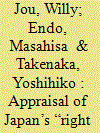

|
|
|
|
|
| Summary/Abstract |
The conservative Liberal Democratic Party won overwhelming victories in the 2012, 2013, 2014, and 2016 elections in Japan. We discuss whether this reflected a rightward shift in the electorate, by examining how major parties and leaders are identified with particular ideological poles, and citizen–government distance on a range of issues.
|
|
|
|
|
|
|
|
|
|
|
|
|
|
|
|
| 2 |
ID:
092500
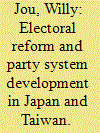

|
|
|
| 3 |
ID:
126130
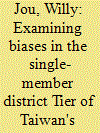

|
|
|
|
|
| Publication |
2013.
|
| Summary/Abstract |
Two elections to the Legislative Yuan have been held under a mixed parallel system. While there have been criticisms that this new set of rules leads to a considerable disparity between parties' vote and seat shares in the district tier, in so far as the new electoral system has been accepted and therefore treated as given by both parties and voters, its fairness should be assessed not by the degree of proportionality, but rather by examining various sources of potential bias. These include differences in electorate sizes and turnout rates across districts, and the efficiency by which votes for the main parties' candidates are distributed. The present study investigates how "fair" the functioning of Taiwan s new mixed parallel system was in the 2008 and 2012 legislative elections by simulating equal and reverse vote scenarios at the district level, and measuring the magnitude of each component of electoral bias. The results show that the operation of the electoral system entails no marked partisan bias, since it does not consistently confer an advantage to either of the main parties or camps.
|
|
|
|
|
|
|
|
|
|
|
|
|
|
|
|
| 4 |
ID:
117036
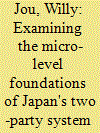

|
|
|
|
|
| Publication |
2012.
|
| Summary/Abstract |
A consensus exists among political scientists and the media that a two party system has become firmly established in Japan, and power alternation following the 2009 House of Representatives election seemed to confirm this trend. In contrast, in this study I draw on both election and public opinion data to illustrate that Japan's two-party system rests on fragile micro foundations, particularly since the change of government, and may therefore not constitute a stable equilibrium. Specifically, the two-party system is sustained by the logic of competition in single member districts, but lacks strong backing among a large proportion of the public. Evidence in support of this argument include 1) decreasing vote shares for both the Liberal Democratic Party and the Democratic Party of Japan in the 2010 House of Councillors election, and 2) a weakening relationship between support for these two parties in monthly polls, in contrast to previous years when LDP and DPJ ratings mirrored one another. I discuss some potential implications of these developments, such as the growing prominence of regional parties and prospects for electoral rule changes.
|
|
|
|
|
|
|
|
|
|
|
|
|
|
|
|
| 5 |
ID:
101806
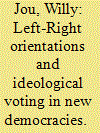

|
|
|
|
|
| Publication |
2011.
|
| Summary/Abstract |
The left-right schema encapsulates major political cleavages and constitutes an important link between voters and parties. Using election surveys in Slovenia covering the period 1992-2004, this study examines the anchoring of left-right orientations by social structure and party preference in Slovenia in comparison with other Central and Western European countries, and discusses differences in levels of ideological voting according to political sophistication, closeness to parties, support for the democratic process, perception of party system polarisation and preferred party. Results show that left-right orientations in post-communist societies are more anchored in partisanship than class and religion, and that higher education and perception of greater party system polarisation are associated with increased ideological voting.
|
|
|
|
|
|
|
|
|
|
|
|
|
|
|
|
| 6 |
ID:
100987
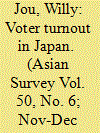

|
|
|
|
|
| Publication |
2010.
|
| Summary/Abstract |
This study examines the effects of socio-demographic and political factors on district level turnout in the 2005 and 2009 Japanese general elections. Results show that marginality is a strong predictor of turnout, while the effects of age structure, joblessness, and primary sector employment vary across elections.
|
|
|
|
|
|
|
|
|
|
|
|
|
|
|
|